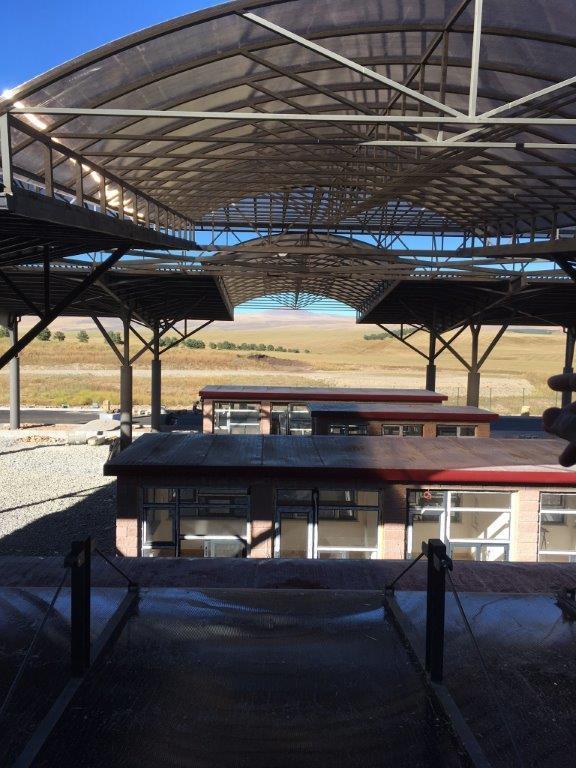
Simplified procedures and reduced waiting times, modern infrastructure and equipment, and improved security – these are only a few of the advantages that the new border crossing point (BCP) in Bavra will provide to citizens of Armenia. Moreover, it will enhance Armenia’s connectivity through promoting international trade, transit and tourism.
Today, Serzh Sargsyan, President of the Republic of Armenia, Vardan Harutyunyan, Chairman of the RA State Revenue Committee, Ambassador Piotr Antoni Świtalski, Head of the European Union (EU) Delegation to Armenia, Bradley Busetto, UN Resident Coordinator/UNDP Resident Representative in Armenia, Sébastien Husson de Sampigny, Head of the European Investment Bank (EIB) Regional Representation for the South Caucasus, representatives of government agencies responsible for border management, as well as international organizations, diplomatic corps and media attended the official opening ceremony of the Bavra BCP within the framework of EU-funded and UNDP implemented project on “Modernisation of Bagratashen, Bavra and Gogavan Border Crossing Points of Armenia” (MBBG).
Opening of the new Bavra facility, together with Bagratashen and Gogavan BCPs, that were officially inaugurated on 4 November 2016, is one more step towards more efficient services by border agencies and enhanced security. But facilities are only one part of the story. This modern BCP and professional border staff will help to facilitate trade and transit of goods, reduce associated time and costs, as well as make cross-border movement of people for business or social purposes more comfortable. Previously, under the 2017 European Border and Coast Guard Agency (Frontex) survey of Eastern Partnership BCPs, Bagratashen BCP (together with Zvartnots International Airport) scored highest in terms of traveller satisfaction of border crossing experience, such as infrastructure, safety, professionalism of border officers, access to additional information, and facilities for children and elderly.
“Opening of the completely reconstructed Bavra Border Crossing Point (BCP) is an excellent example of EU-Armenia cooperation to improve the connectivity of Armenia and support its trade and economic development. The upgraded Bavra BCP is in line with the international standards and designed to provide convenient framework for businesses and citizens. Together with Bagratashen and Gogavan BCPs it will ensure 3 alternative routes for goods movement between Armenia - Georgia and beyond, stimulating also development of regions/marzes through which the routes are passing”, said the EU Ambassador to Armenia Piotr Świtalski, “EU is committed to continue support in this field and works closely with all Armenian counterparts to replicate this design at other BCPs of Armenia”.
Sébastien Husson de Sampigny, Head of the EIB Regional Representation for the South Caucasus, commented: “I welcome that the EIB funding contributed to the upgrade of the three border crossings between Armenia and Georgia. Based on my personal experience, this greatly facilitates travel of people and exchange of goods and thus being of benefit for the whole region and the European Union”.
“Improving Armenia’s connectivity to the region and the rest of the world can contribute significantly to increased trade and transit, tourism, and foreign direct investment – all supportive of Armenia’s national priorities. Having a modern border infrastructure and efficient border management procedures will further boost the Government’s economic agenda, making Armenia a transit country itself for goods destined for Georgia, Iran and beyond”, said Bradley Busetto, UN Resident Coordinator/UNDP Resident Representative in Armenia. Mr. Busetto expressed his appreciation to the EU institutions, the Government of Armenia and all other stakeholders for the excellent partnership during the implementation of all border management initiatives, and reiterated UNDP’s readiness and commitment in continuing its support to the Government of Armenia in its efforts to implement the ambitious reform program in border management.
The Government of Armenia has received 30.8 million Euros in loan for the project from the European Investment Bank, used for infrastructure and equipment at the three Border Crossing Points. This loan was complemented by a grant of 17.6 million Euros from the European Union. UNDP acted as the main implementer of the project, also providing a financial contribution of 1.9 million Euros.
A Consortium led by the French company SADE was the contractor for construction works; the construction supervision was provided by Belgian SAFEGE Consulting Engineers.
UNDP partners with people at all levels of society to help build nations that can withstand crisis, and drive and sustain the kind of growth that improves the quality of life for everyone. On the ground in nearly 170 countries and territories, we offer global perspective and local insight to help empower lives and build resilient nations. UNDP in Armenia was established in March 1993, and supports the government in meeting its development priorities and the Sustainable Development Goals.
The European Commission is the EU’s executive body. The European Union is made up of 28 Member States who have decided to gradually link together their know-how, resources and destinies. Together, during a period of enlargement of 50 years, they have built a zone of stability, democracy and sustainable development whilst maintaining cultural diversity, tolerance and individual freedoms. The European Union is committed to sharing its achievements and its values with countries and peoples beyond its borders.
The European Investment Bank (the EU’s bank) finances projects in Armenia on the basis of an EU Council and European Parliament mandate for the countries of the Eastern Neighbourhood. Until now, the EIB provided 10 sovereign loans to the Republic of Armenia with a total amount of EUR 207m. The current 2014-2020 mandate allows the EIB to provide financing of up to EUR 4.8 billion to support projects of significant interest to both the EU and its Eastern Neighbours in the areas of local private sector development, social and economic infrastructure and climate change. To enhance this support the Bank also has set up an own-risk Neighbourhood Finance Facility in the amount of EUR 3 billion.




